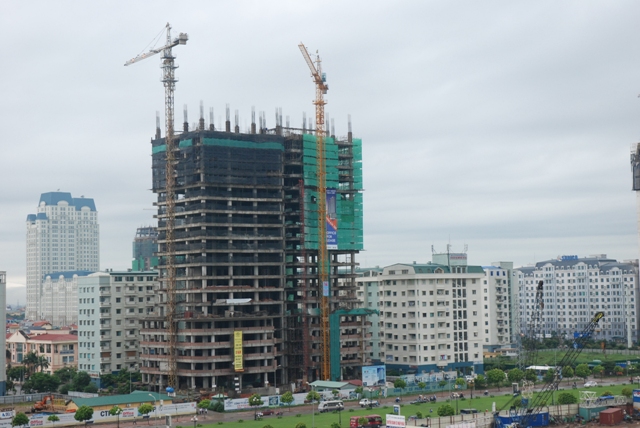A draft house and land tax law will tighten Vietnam’s land crunch while leaving the real estate market in the hands of speculators, experts said Monday.
Residential land, houses, and land for commercial purposes other than cultivation are currently not subject to taxes. But the Finance Ministry draft, to be submitted to the National Assembly for discussion later this year, aims to change all that.
Over population  Under the new draft, expected to become law at the beginning of 2011, homes will be taxed according to the value of the house written in the sale contract.
Under the new draft, expected to become law at the beginning of 2011, homes will be taxed according to the value of the house written in the sale contract.
But Dang Hung Vo, a lecturer on land and housing use at Vietnam National University in Hanoi, said houses should be taxed according to the area they are built on.
“House value should play a very minor role.”
Experts like Vo say both housing and land taxes should help save land by encouraging investors to use space frugally.
Nguyen Quang, head of the Hanoi branch of the United Nations Human Settlements Program (UN-HABITAT), agreed with Vo. Although taxing houses based on their value is the international standard, he argued that the method “does not suit the situation in Vietnam.”
Developers would be discouraged from investing up and instead spend more money building housing on large land plots, he said, arguing that the country was already starved for space and couldn’t afford to waste land with the 85-million-plus population still growing.
The Construction Ministry had also suggested implementing housing taxes based on land area in a 2007 proposal.
Attention to detail
Tran Du Lich, deputy head of the National Assembly representative committee from Ho Chi Minh City, supported the value-based house tax law because it accords with international norms, but he said the law needed to delineate more housing categories to be fair to all residents.
The proposal would tax houses valued between VND600 million (US$33,700) and VND1.2 billion to 0.05 percent of their total value.
Those costing more would be taxed 0.1 percent.
“So owners of a VND10-billion house will pay the same tax as those who own a VND1.3-billion house. But they should obviously pay more,” Vo said.
Quang from UN-HABITAT said the lack of detail could destroy the goal of the house tax – to collect money from the rich to build free homes for the poor.
But Vo also said people who only live in their houses should be exempt from tax while those using their houses for commercial purposes should pay more than the proposed taxes.
Many people use their houses for rent or to set up stores, he said.

Land tax vagaries
Although the draft land tax pertains to lot size, critics argue it’s far too vague to be effective.
The proposed law would tax a piece of residential land 0.05 percent of its value within a certain size limit and 0.1 percent if the limit was exceeded. All commercial land would be taxed 0.05 percent.
However, experts say land that is used effectively should be taxed less while deserted land or land given to delayed projects should be taxed more.
“If you buy a piece of land and fail to set up a house after two years, you should be taxed 10-20 percent of the land value,” said Lich.
Such heavy taxes would prevent people from speculating, he said. “They’ll stop trying to flip properties if they are taxed more than their potential profit.”
- HCM City seeks infrastructure cash
- Vietnam gov’t sweetens deal for low-income housing
- Trade in building bids leads to shoddy work
- Landlords, tenants spar over padded rents
- Spanish firm sets up branch in town
- National Assembly ponders easier rules for Viet kieu
- The Thieu Phuong Imperial Garden to be restored
- Real estate market shows resilience
- HCM City attracts 25.6 billion USD in FDI
- Viet Nam eyes foreign investors to revive local real estate market
